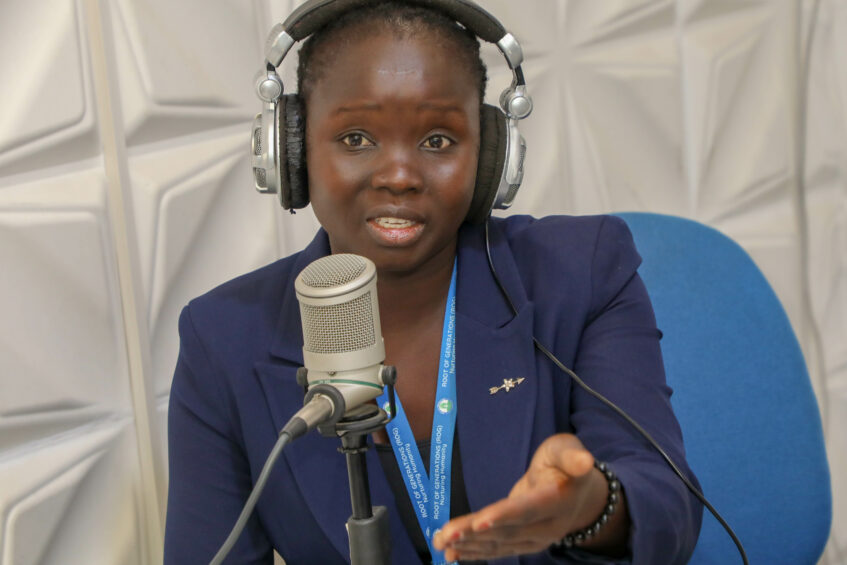You are here: Home | Humanitarian | News | Activist urges end to all forms of human trafficking in South Sudan

Dorong Grace, Executive Director of Root of Generations speaks on Eye Radio's Dawn Show. July 28, 2023. (Photo: Awan Moses/Eye Radio).
A human rights activist is calling for an end to human trafficking in South Sudan, as the country marks World Day Against Trafficking in Persons.
Grace Dorong – the Coordinator for Human Anti-trafficking Network in South Sudan – says the practice is a violation of human rights.
Activist Dorong – who is also the Executive Director of Root of Generations organization – is urging governments, private sectors, and all stakeholders to prevent human trafficking in the country.
She said the forms of trafficking in South Sudan include child labor, mistreatment of children, forced labor, sexual exploitation and sexual slavery.
“When you bring the child of your relative or someone from the other side to Juba and you keep this child at home to work for you and take care of the young ones and your children go to school, that is trafficking,” Dorong.
“When you bring a domestic worker to work for you and then you use this person at the same time to satisfy your sexual desire that is trafficking.”
“When you mistreat one of your children at home, or when you have domestic workers at your hotel and you don’t pay them well, or you mistreat them. So, I pass this message to everyone that lets us ensure to be observant.”
Dorong said the phenomenon mostly happens to migrant workers and vulnerable South Sudanese populations.
“This doesn’t only happen to migrants by the way, trafficking happens to everyone, to South Sudanese especially the vulnerable, people who work in the hotels, who work in these accommodation places, they [some of them] are being mistreated, so that is another form of slavery.”
Human trafficking is the trade of humans for the purpose of forced labor, sexual slavery, or commercial sexual exploitation.
The phenomenon can occur within one country or across international borders.
Meanwhile, human trafficking is distinct from people smuggling, which is characterized by the consent of the person being smuggled.
On 30 July 2010, the UN General Assembly adopted a Global Plan of Action to Combat Trafficking in Persons urging World governments to take coordinated and consistent measures to defeat this scourge.
The Plan calls for integrating the fight against human trafficking into the UN’s broader programs in order to boost development and strengthen security around the World.
In 2013, the general assembly adopted a resolution designating 30 July every year as Anti-Trafficking Day.
The day is meant to raise awareness of the situation of victims of human trafficking and for the promotion and protection of their rights.
The global theme for this year is “Reach every victim of trafficking, leave no one behind.”
Support Eye Radio, the first independent radio broadcaster of news, information & entertainment in South Sudan.
Make a monthly or a one off contribution.
Copyright 2024. All rights reserved. Eye Radio is a product of Eye Media Limited.